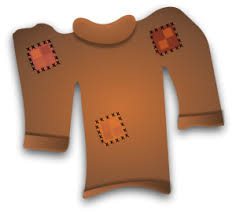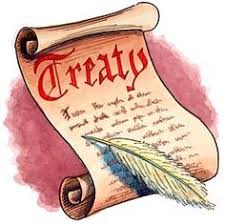Joshua 9:1-2 – As soon as all the kings who were beyond the Jordan in the hill country and in the lowland all along the coast of the Great Sea toward Lebanon, the Hittites, the Amorites, the Canaanites, the Perizzites, the Hivites, and the Jebusites, heard of this, they gathered together as one to fight against Joshua and Israel.
As we saw in chapter 8, Israel was victorious in their second attack against Ai.

Assuming Israel traveled to Mount Ebal to worship and renew the covenant, there was a period of several weeks (or more) between chapters 8 and 9.� During this time, Israel rested and prepared to move forward with the next stage of the conquest.�
Meanwhile, their enemies were finally starting to make plans for fighting back.� Truthfully, it's really odd that they didn't do this sooner.� After all, they were well informed of the miraculous events surrounding Israel:
- God freed them from the rule of Egypt after punishing Pharaoh and his people with the 10 plagues.�
- God parted the Red Sea so Israel could safely cross over.�
- God supplied food, water and clothing for them for the past 40 years.�
- God led and protected his people with a pillar of fire/cloud.�
Furthermore, they knew that God had promised to give the land of Canaan to his people. So, it wasn't like the kingdoms of Canaan didn't have advanced warning that Israel was coming! Therefore, it is strange to think that they did not make any plans or alliances before Israel crossed the Jordan and defeated both Jericho and Ai.
On the other hand, it was even stranger for the Canaanites to try and fight back now. They certainly had full knowledge of the events that had taken place at Jericho. They knew that Jehovah had miraculously intervened and caused the walls to fall, so Israel could rush in and take the city. They were aware that Ai had been taken by ambush.

Knowing this, we can't help but wonder why the kings of Canaan didn't reach out to Israel to try and work out a peace treaty, rather than making futile plans to destroy them in battle.� We can only surmise that their minds and hearts were blinded by Satan.
At any rate, the kings of Canaan formed some kind of political/military alliance in which all the kingdoms agreed to fight together against their common enemy.� Think about that for a minute – in the past, each of these small kingdoms had fought against the others for various reasons.� Each was always trying to get the best of his neighbor.� Yet, they put aside their differences and united themselves under the common goal of destroying the enemy.�
This is a great lesson for the church, if only we would learn it!
This verse mentions the coast of the 'great sea', also known as the Mediterranean Sea. That area was largely inhabited by the Philistines, Phoenicians, Syrians and Sidonians. It is likely that these people groups also united with the Canaanites against Israel.
Joshua 9:3-5 – But when the inhabitants of Gibeon heard what Joshua had done to Jericho and to Ai, they on their part acted with cunning and went and made ready provisions and took worn-out sacks for their donkeys, and wineskins, worn-out and torn and mended, with worn-out, patched sandals on their feet, and worn-out clothes. And all their provisions were dry and crumbly.
The city of Gibeon was in a cluster with three other towns – Chephirah, Beeroth and Kiriath-jearim. Together, they formed a kingdom that was mainly inhabited by Hivites. These cities were located approximately six miles north-west of Jerusalem.
There are no records that indicate that Gibeon had a king.� It appears that this federation of cities was governed by a group of elders or senators as opposed to a single ruler.

Clearly, these senators had a better understanding of the political landscape than the kings of Canaan. They seem to have figured out that all the inhabitants of Canaan were to be destroyed and they correctly surmised that they could not be militarily victorious over Israel and her God, Jehovah.
They also realized that if this was truly the case, Israel had no incentive to make a peace treaty with them. (The leaders of Gibeon may or may not have known that Israel was forbidden to make a treaty with them – Deuteronomy 7:1-2). Israel could simply destroy them and take their territory in the same way they defeated Jericho and Ai.
The bottom line is that the kingdom of Gibeon passed up the opportunity to be part of the Canaanite alliance, because they believed it would result in failure. Because of this refusal, Gibeon is now odious in the sight of the other kingdoms. The kings of Canaan feel that Gibeon has weakened the alliance; their failure will result in Israel gaining yet another foothold in Canaan.
But the senators of Gibeon have other plans.� Instead of using military force, they decided to try and defeat Israel through deceit and trickery.
While this seems like a long shot, it was their only hope. If their gambit failed, they would be doomed to death, which was the same outcome they expected through battle, so they had nothing to lose.

Their basic plan is to pretend they have come from a very far country seeking to make peace with Israel and serve Jehovah.
That seems like a weird plan, unless you are familiar with the commands of the Lord in Deuteronomy 20. In that chapter, God gives Israel some basic laws concerning warfare.
According to Deuteronomy 20, when Israel comes near to a city which is 'far from them' with the intention of warring against it, they are first to offer terms of peace to the people of the city:
Deuteronomy 20:10 – When you draw near to a city to fight against it, offer terms of peace to it.
If the city accepts Israel's offer, the people will live and become forced labor for the nation of Israel. If they refuse to make peace, Israel is to kill all the inhabitants of the city and take their possessions as spoil after they capture it.
God is very specific that this is the rule when dealing with kingdoms that are not in Canaan:
Deuteronomy 20:15 – Thus you shall do to all the cities that are very far from you, which are not cities of the nations here.
As surprising as it sounds, the men of Gibeon must have known about this law; no other explanation satisfactorily accounts for their actions. Some scholars wonder if the Gibeonites had spies that witnessed/heard the events on Mount Ebal and acquired this information on that occasion.
Regardless of how they knew this fact, the men of Gibeon approach Joshua pretending to be ambassadors from a distant foreign nation.

Obviously, back in that era there were no hotels or other amenities for travelers.� Those embarking on a long journey had to take supplies with them.� So, to make their story plausible, the Gibeonites show up with old worn-out shoes, torn and mended clothing, stale bread, wineskins that are patched and saddle bags that are falling apart.�
It seems odd that their shoes would be worn out, until we realize that those who could only afford a single donkey or mule loaded it up with supplies for their journey, and then walked alongside the animal. This practice would naturally account for the worn out shoes.
Joshua 9:6 – And they went to Joshua in the camp at Gilgal and said to him and to the men of Israel, "We have come from a distant country, so now make a covenant with us."

The men of Gibeon travel to Gilgal, the camp Israel had established near the Jordan River before they fought Jericho.� Once they arrived, they asked for a meeting with Joshua, the elders and the heads of each tribe, who made up Joshua's advising board/council.
We can surmise that they flattered the men of Israel, detailing how they heard of their great military feats and of the miracles of Jehovah.
Eventually the Gibeonites got around to the purpose of their visit – they asked Joshua/Israel to make a covenant of peace with them, because they came from a distant land. It said it was their desire to be friends/allies of Israel and to serve Jehovah.
Joshua 9:7-8 – But the men of Israel said to the Hivites, "Perhaps you live among us; then how can we make a covenant with you?" They said to Joshua, "We are your servants." And Joshua said to them, "Who are you? And where do you come from?"
Clearly, Joshua and the elders had concerns about this request. Their hesitation was founded, at least in part, on the command that God had given them when they left Egypt:
Exodus 23:31-32 - �I will give the inhabitants of the land into your hand, and you shall drive them out before you. You shall make no covenant with them and their gods.
(See also Exodus 34:10-12, Numbers 33:55, etc).
The men of Gibeon cleverly avoid giving Joshua any definite information.� They simply reply, 'We are your servants.'� This statement implies that they are humble people who acknowledge the inferiority of their own nation as compared to the greatness of Israel; their only desire is for both nations to live in peace through a mutual alliance or covenant.
For his part, Joshua does not seem fully convinced by their story. He continues to ask for more specific information. He seems concerned to protect the nation against deceit as well as against open force.

We should remember that our spiritual enemies also come in two forms. Satan is not only a roaring lion seeking those he can devour (I Peter 5:8), he is also the sly serpent who fooled Eve with a half-truth in the Garden of Eden (Genesis 3:4).
I venture to say that more people have fallen into sin when confronted with a half-truth than when confronted with an outright lie or faced with persecution.
For this reason, it is very important that we are in the word of God daily.� We need to know EXACTLY what the word says, as opposed to just having some vague idea of what we think God said or promised. �
Joshua 9:9-10 – They said to him, "From a very distant country your servants have come, because of the name of the Lord your God.� For we have heard a report of him, and all that he did in Egypt and all that he did to the two kings of the Amorites who were beyond the Jordan, to Sihon the king of Heshbon, and to Og king of Bashan, who lived in Ashtaroth."
The cleverness of the Gibeonites can be seen in their reply to Joshua. They pretend to have undertaken their journey for religious reasons - to acknowledge the greatness of Jehovah and the miracles he has already performed on behalf of his people. They imply that they have the highest respect for Jehovah and would like to become his worshipers. But sadly, this was all a lie designed to ingratiate themselves with Joshua. What hypocrites they were!
They are also smart enough to mention Israel's deliverance from Egypt as well as their victories over Sihon and Og, while leaving out any references to Jericho or Ai. Denying any knowledge of these recent events gives further support for the false story that they had come from a nation far away.
Joshua 9:11-13 – So our elders and all the inhabitants of our country said to us, 'Take provisions in your hand for the journey and go to meet them and say to them, "We are your servants.� Come now, and make a covenant with us.� Here is our bread.� It was still warm when we took it from our houses as our food for the journey on the day we set out to come to you, but now, behold, it is dry and crumbly.� These wineskins were new when we filled them, and behold, they have burst.� And these garments and sandals of ours are worn out from the very long journey."
The Gibeonites have gone 'all out' to make their story believable. They take great pains to show the men of Israel the worn-out state of their supplies, which they claim is evidence that their story is true.

We also notice that the Gibeonites do not request any specific terms for the treaty, which was odd. They are willing to accept a pledge of peace on any terms, as long as the process takes place immediately – before their deception is detected! It may have been the lack of give-and-take on the treaty or the undue haste to ratify an agreement that made Joshua wary of their request.
Joshua 9:14 – So the men took some of their provisions, but did not ask council from the Lord.
Alas!� The men of Israel looked at what was presented to them in the natural realm (the moldy bread, torn clothing etc) and made a decision on what appeared to be true.�
It was inexcusable for them to make such a serious decision on such limited facts.� Their decision was even MORE inexcusable when you consider that they could have sought the council of God at any time.�

Hadn't they just seen the way God was able to pick a single man (Achan) out of the entire nation of people? Hadn't they just witnessed how God revealed to Joshua exactly what Achan had done wrong and where the stolen items were located? Wasn't the high priest standing by, at that very moment, to inquire of the Lord for them (Numbers 27:21)? Yet, they did not consult him!
This treaty was an important matter which deserved a full/complete investigation before a decision was rendered. The fact that the leaders of Israel did not consult God shows their actions were negligent and foolish.
In summary, we could say that Israel was trusting in outward appearances only, without seeking the advice of God, who is more than happy to give his people a direct revelation of his will.
God is still in the business of speaking to his children today:
John 10:27 - My sheep hear my voice, and I know them, and they follow me:
However, we often make the same mistake that Joshua and the elders made – we don't bother to consult God before making important decisions.� Even though we think we can weigh the evidence ourselves, it is always good to ask God for confirmation before making critical decisions in life.��

At other times, we hear what God is saying, but shockingly, we don't listen. When that happens we are acting out of a spirit of lust (we want what we want, whether or not God has approved it for us) or a spirit of pride (I know more than God).
We must avoid these mistakes at all costs!
Let's pause here and ask ourselves the 'what if' question: What if Joshua had asked the Lord for guidance in this situation? What do you think would have happened?
For one thing, we can be sure that God would certainly have revealed the lies of the ambassadors. In addition, most scholars believe God would have spared the Gibeonites from destruction, as long as they repented, cast out their idols and agreed to live by the laws of the covenant. In other words, if they truly wanted to become followers or children of God, they would have been given that opportunity (John 6:37).
Joshua 9:15 – And Joshua made peace with them and made a covenant with them, to let them live, and the leaders of the congregation swore to them.
Joshua and the men of Israel agree to make a covenant of peace with the men of Gibeon. This covenant was more than just a pledge not to kill them. It also entailed the protection of the Gibeonites' territories, privileges and liberty.
The covenant was ratified by an oath on the part of Israel. They did not swear by themselves or by any of the gods of Canaan, but by Jehovah, the God of Israel. In other words, Israel had called upon God to witness the sincerity of their promise to Gibeon.
Joshua 9:16 – At the end of three days after they had made a covenant with them, they heard that they were their neighbors and that they lived among them.
The question is, how did Israel discover the truth?

One possibility is that the ambassadors of the Gibeonites sent someone from their party back to the city to bring tiding of success to their fellow countrymen. When the cities of the kingdom heard this good news, they couldn't help but celebrate.
Meanwhile, Israel undoubtedly sent spies out to gather information on the next cities/kingdoms to be conquered after Ai. As they quietly scouted out the area of Gibeon, they heard news of the treaty and realized Israel had been duped.
Another possibility is that some deserters from one of the other Canaanite cities happened upon an Israeli scouting party and told them of the fraud.
Joshua 9:17 – And the people of Israel set out and reached their cities on the third day. Now their cities were Gibeon, Chephirah, Beeroth, and Kiriath-jearim.
When the fraud was discovered, a bigger detachment of soldiers was sent to the kingdom of Gibeon to confirm the truth.
Joshua 9:18-19 – But the people of Israel did not attack them, because the leaders of the congregation had sworn to them by the Lord, the God of Israel. Then all the congregation murmured against the leaders. But all the leaders said to all the congregation, "We have sworn to them by the Lord, the God of Israel, and now we may not touch them."
Now Israel is faced with a perplexing problem: Since Gibeon had been deceitful in obtaining the covenant, did Israel have to honor it?
On the one hand, a case could be made for voiding the covenant since the Gibeonites caused Israel to swear an oath based on a fraudulent claim. The people of Israel could hardly be expected to obligate themselves to a contract which hinged on deception.

This seems to have been the opinion of the general population. They griped and complained to the leaders about honoring the treaty. However, most commentators attribute this to a spirit of greed. They feel the people of Israel were angry because they were denied the spoils of the four cities.
On the other hand, some maintain that the oath, although unlawfully made, did not require Israel to do an unlawful thing.� Therefore, the covenant should stand.� They point out that it was Israel's own carelessness that led them into the treaty and it was now their duty to abide by it.� ��
However, there is yet another consideration. We find that the rulers of Israel were very loath to break the agreement because they had sworn by/invoked the name of the Lord when making the treaty. They were very concerned that the wrath of God would fall upon them if they broke the covenant.
Besides, if they broke their oath, it would bring dishonor to the name of God among the heathen nations. They don't want to provide the people of Canaan with a reason to distrust or doubt Jehovah. Besides, breaking the covenant wouldn't negate their sin/fault in making the covenant in the first place.

In the end, the leaders of Israel will keep their promise and enforce the treaty, despite the discontent of the people.� They will not annihilate the people of Gibeon.� This actually caused Israel to suffer economically, as they did not obtain the spoil of these four cities. �
So, we find that Israel was willing to suffer loss in order to make sure that the name of the Lord remained unsoiled. This was a difficult but important lesson and one that we should consider following in our own lives. And, as we will shortly discover, God was pleased with their decision. Through their commitment to this covenant, God gave Israel her biggest military victory in all the wars of Canaan.
Joshua 9:20-21 – This we will do to them: let them live, lest wrath be upon us, because of the oath that we swore to them. And the leaders said to them, "Let them live." So they became cutters of wood and drawers of water for all the congregation, just as the leaders had said of them.
Though Israel committed to sparing the lives of the Gibeonites, they punished them for their deception. They were sentenced to life-long servitude to the nation.
This decision pacified the discontented congregation of Israel.� Although they were angry when the Gibeonites were spared, their anger was appeased when they discovered the Gibeonites and all their future generations were subject to perpetual servitude. Besides, the labor of the Gibeonites was a better public advantage than the spoil Israel would otherwise have obtained.�
It also fulfilled another critical role.� The main reason the people of Canaan were to be slain was because they would tempt Israel to serve false gods.� However, the influence of the Gibeonites (and thus their ability to coax Israel into serving false gods), was severely diminished when they were brought into menial servitude.� In this way, the spiritual threat against Israel was nullified.
Joshua 9:22-23 – Joshua summoned them, and he said to them, "Why did you deceive us, saying, 'We are very far from you,' when you dwell among us? Now therefore you are cursed, and some of you shall never be anything but servants, cutters of wood and drawers of water for the house of my God."
These verses center around the public trial of the Gibeonites.� We can safely assume that by this time, the senators or other ruling elders of the four cities have traveled the short distance to Gilgal to meet with Joshua.� Perhaps the troops of Israel forced them to come.� ��

In the presence of Gibeon's leaders, Joshua delivers the case for the prosecution.� He first reproves them for deceiving Israel, then gives specific evidence of their lies.� No doubt the worn-out clothing, the moldy bread and the torn wineskins were all submitted into evidence.�
Joshua then gives the verdict – he pronounces them cursed and passes sentence upon them. In so doing, Joshua throws the blame of their servitude back upon themselves. No injustice has been done to the Gibeonites; they cursed themselves by their actions.
Interestingly, the men of Gibeon will respond by saying they felt compelled to lie in order to secure the treaty and they acknowledge their punishment to be just and fair.
There is some debate over the actual terms of their servitude.
It is possible that the term 'cutters of wood and drawers of water' is a generic expression that simply refers to any menial servile task.

But in this instance, with the addition of the phrase 'for the house of my God', the punishment seems more literal.� The daily sacrifices and worship of the temple required vast amounts of both firewood and clean water.� In addition, there were vessels to clean, ashes to shovel/remove, floors to sweep, etc. �By providing this menial labor for the tabernacle, the Gibeonites were essentially serving the entire nation.�
But their sentence also held an undercurrent of mercy.� They would be forever tied to temple service, which would provide them with knowledge of the law of God.� It would also keep them close to God; there would be little chance to backslide into serving baal or the other Canaanite gods.�
Joshua 9:24-25 – They answered Joshua, "Because it was told to your servants for a certainty that the Lord your God had commanded his servant Moses to give you all the land and to destroy all the inhabitants of the land from before you – so we feared greatly for our lives because of you and did this thing. And now, behold, we are in your hand. Whatever seems good and right in your sight to do to us, do it."
Here we find the defense that the Gibeonites gave during their trial.
They found out about the command of God to destroy all the inhabitants of the land of Canaan.� Based on the miracles that God had already performed for Israel (freeing them from Egypt, parting the Red Sea, manna and water in the wilderness, etc) and the military victories he had given them (Sihon, Og, Jericho, Ai, etc), the Gibeonites concluded that God's sovereignty was incontestable and his justice inflexible.�
In their minds, the only option left was to cast themselves on his mercy. This does not justify their lies or their behavior, but it does explain their motivation – fear. They were thinking only in terms of self-preservation.
Joshua 9:26-27 – So he did this to them and delivered them out of the hand of the people of Israel, and they did not kill them. But Joshua made them that day cutters of wood and drawers of water for the congregation and for the altar of the Lord, to this day, in the place that he should choose.

This is not the end of the story for the Gibeonites. When they were brought into servitude their national importance/influence ceased to exist. They forfeited their cities; three of them fell to the lot of Benjamin and one to Judah. They themselves were dispersed into Jerusalem and the other cities of the Levites and priests. As the priests rotated into Jerusalem to serve in the temple, the Gibeonites came with them.
Yet, they were never permitted to be incorporated into the nation of Israel. They simply existed as a nation of servants (Genesis 9:25).
Why do you suppose this was the case?� Why weren't they adopted into the nation as Rahab was? ��

The answer is, because their situation was different from that of Rahab.� She truly wished to serve Jehovah as God.� By contrast, the Gibeonites sought a union with Israel simply as a means to save their own lives; they were not interested in serving God or knowing about him. �
Nevertheless, that covenant never ended. Hundreds of years later, during the reign of King David, we find that Israel was in the midst of the third year of a famine. When David brought this matter before the Lord, he was told that Israel's suffering was the result of King Saul unjustly killing the Gibeonites. Israel remained under God's disfavor until they made restitution for this (II Samuel 21).
Let me offer you some encouragement, relief and strength:
Hundreds of years after these events occurred King Solomon gave a proverb that accurately summed up this whole situation:
Proverbs 3:5-6 - Trust in the LORD with all your heart; and lean not unto your own understanding. In all your ways acknowledge him, and he shall direct your paths.
How can we apply these principles to our own lives?
- I encourage you to seek the Lord in all of life's major decisions.� Even if you think you can read the facts correctly and you believe you have made a sound decision, you should consider getting a confirmation from the Lord.� Scripture tells us that our God is the only one who knows the end from the beginning (Isaiah 46:9-10).� Since he knows the future, he knows how kingdoms, circumstances and events are going to change.� He alone understands the impact your decisions will have in the future.� So lean into him, ask for wisdom and follow his advice! ��
- When Holy Spirit nudges you to take a second look at something, take the time to listen to him.� Clearly, Joshua had some misgivings about the story he was told by the ambassadors of Gibeon.� But it doesn't appear as though he investigated much further.� What caused him to ignore his uneasiness?� Was it a time crunch?� Did he feel like he was the only one who had an issue with their story?� Did he allow the majority to make a decision without speaking his mind?� ��
- What about you?� Have you ever been in a situation where you had those same misgivings?� Perhaps your mind was not at peace, or you felt a 'check' in your heart/spirit, or your intelligence told you that something just wasn't adding up, so to speak.� If so, DON"T IGNORE THESE SIGNS.� They may very well be promptings from Holy Spirit to warn you that something isn't right.� When you feel them, stop and ask God to give you supernatural wisdom in that situation.
- It is obvious that God had mercy on Joshua; He made the situation with the Gibeonites turn out okay.� But at the same time, Joshua certainly suffered for his mistake.� I am sure he had many sleepless nights until this situation was resolved.� He was publicly embarrassed for making such an obvious mistake.� He had to deal with the one thing he most feared – a complaining spirit taking hold of the congregation of Israel.� He lost some influence with the other kings of Canaan and possibly with some of his own elders.� The people of the nation suffered a financial loss.�
- Joshua could have spared himself all of that heartache and trouble by seeking the council of God instead of trusting his own wisdom.� I don't know about you, but I have no interest in sleepless nights, embarrassment or financial loss.� I am committing myself to asking God for confirmation of all my major decisions! ��
- While these lessons certainly apply to us as individuals, they also apply to the church.� Satan is out to deceive God's people, to make us look stupid and inept in front of the world, and to cause us as much trouble as he can.� His goal is to stop us from advancing the kingdom of heaven. Fortunately, we are not ignorant of his tricks (II Corinthians 2:11).�
May the church of Jesus Christ press forward in the advance of his kingdom just as Israel advanced to take the Promised Land!
��
